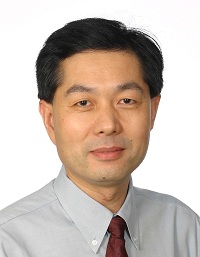
|
Dr. Cuntai Guan is currently the Principal Scientist and Department Head at the Institute for Infocomm Research, Agency for Science, Technology and Research (A*STAR), Singapore. He is the A*STAR Programme Leader of Neuro-Technology. He received his PhD degree in electrical and electronic engineering from Southeast University in 1993. His career began with research and development on speech recognition, text-to-speech, and spoken dialogue technologies. He was a lecturer, visiting scientist and researcher at Southeast University, CRIN/CNRS-INRIA, City University of Hong Kong, and Kent Ridge Digital Laboratories, from 1994-1998. He then spent 5 years in industry (Lernout & Hauspie, InfoTalk Technology), as a Research Manager and the R&D Director. Since 2003, he founded and directed the Brain-computer Interface (BCI) Laboratory at the Institute for Infocomm Research. From 2007 to 2012, he founded and directed two research programs on medical and healthcare technology at the Institute for Infocomm Research. These research programs covered research areas in neuro-technology, medical image processing, ambient intelligence, activity monitoring, biomedical signal processing, health monitoring, diagnosis, rehabilitation, treatment, and decision support. Since 2012, he founded and directed a research department, Neural & Biomedical Technology Department at the Institute for Infocomm Research, focusing on brain-computer interfaces, neural and biomedical signal processing and sensing, neural and biomedical image processing.
Dr.Guan's research interests include neural and biomedical signal processing, machine learning and pattern recognition, neural and cognitive process and its clinical applications, brain-computer interface algorithms, systems and applications, statistical signal processing, neural image processing, medical system and device research and development. He is the recipient of Annual BCI Research Award 2010, IES Prestigious Engineering Achievement Award 2009, Achiever of the Year (Research) Award 2011. He published over 200 refereed journal and conference papers and holds 14 granted patents and applications. He licensed 7 patents to US and Singapore based companies. He secured over $9.8M research grant as principal investigator and co-investigator in the past 5 years. He delivered over 40 keynote speech and invited talks. He is on Editorial Board of IEEE Transactions on Biomedical Engineering, IEEE Access (life sciences and biomedical engineering), Australasian Medical Journal, Frontiers in Neuroprosthetics, and A*STAR Research Publication.
|